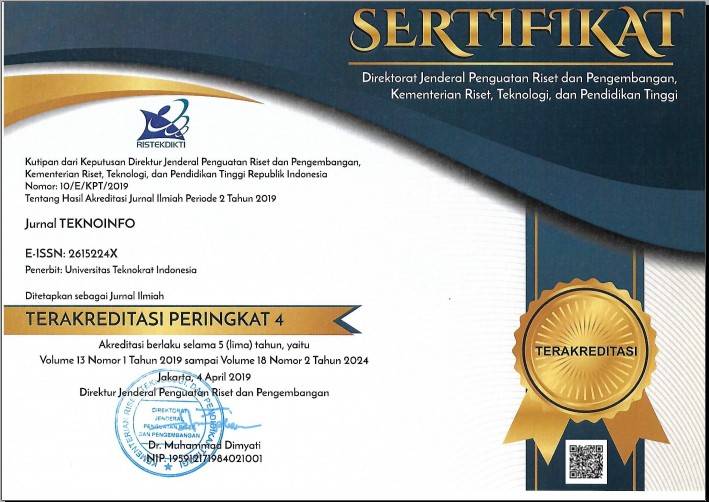IMPACT OF ORGANIZATIONAL CULTURE ON KNOWLEDGE SHARING IN INDONESIAN SOFTWARE DEVELOPMENT COMMUNITY
Abstract
In the dynamic landscape of software development, effective knowledge sharing is vital for fostering collaboration and innovation among development teams. This study examines the intricate dynamics influencing knowledge sharing among software developers within organizational contexts, focusing on the pivotal factors of organizational culture. Key factors such as communication, trust, leadership, reward systems, and organizational structure are investigated to comprehend their impact on knowledge-sharing behavior. The research model posits hypotheses exploring positive relationships between trust, communication, leadership, organizational structure, reward systems, and knowledge sharing. Data was collected through online surveys completed by 62 software developers in Indonesia, and SmartPLS 3 was used for the analysis. Measurement models were employed to evaluate internal consistency reliability, convergent validity, and discriminant validity, while structural models assessed the explanatory potential. Results indicate that the explanatory power of the model is weak, suggesting a need for further exploration. Leadership and reward systems were found to have a positive influence on knowledge sharing, although the impact of organizational structure remains inconclusive. The study emphasizes the critical roles of reward structures and leadership in encouraging knowledge sharing and presents practical implications for companies aiming to enhance their knowledge management practices. These findings highlight the necessity for organizations to foster leadership and implement effective reward systems to promote a culture of knowledge sharing. Furthermore, the study suggests improvements in assessment techniques and calls for a reevaluation of the connection between organizational structure and knowledge sharing. This research contributes to the understanding of how organizational culture impacts knowledge sharing within the software development community in Indonesia, providing valuable insights for both academic researchers and industry practitioners.
Full Text:
PDFReferences
D. D. Dereli, “Technology management in global competition and competitive advantage,” Pressacademia, vol. 4, no. 1, 2017, doi: 10.17261/pressacademia.2017.549.
D. A. P. Zainal, R. Razalia, and Z. Mansora, “Team formation for agile software development: A review,” International Journal on Advanced Science, Engineering and Information Technology, vol. 10, no. 2. 2020. doi: 10.18517/ijaseit.10.2.10191.
О. Skakalina and A. Kapiton, “IDENTIFICATION AND MANAGEMENT OF RISKS IN THE PROJECT MANAGEMENT OF THE DEVELOPMENT OF SOFTWARE PRODUCTS,” Системи управління, навігації та зв’язку. Збірник наукових праць, vol. 1, no. 71, 2023, doi: 10.26906/sunz.2023.1.145.
A. R. S. Araujo, H. P. De Moura, and C. França, “Complexity within software development projects: An exploratory overview,” Revista Gestão.Org, vol. 3, no. Edição Especial, 2015.
V. H. Medina Garcia, E. Rivas Trujillo, and J. I. Rodriguez Molano, “Knowledge management model to support software development,” in Lecture Notes in Computer Science (including subseries Lecture Notes in Artificial Intelligence and Lecture Notes in Bioinformatics), 2018. doi: 10.1007/978-3-319-93803-5_50.
J. Ma, R. Du, S. Ma, and W. Zhang, “Factors affecting knowledge sharing in governmental fiscal departments: An empirical study,” in IE and EM 2009 - Proceedings 2009 IEEE 16th International Conference on Industrial Engineering and Engineering Management, 2009. doi: 10.1109/ICIEEM.2009.5344255.
A. I. Al-Alawi, H. Elias, and A. Mehrotra, “The Effect of Organizational Culture on Knowledge Sharing: Case of Logistics Companies,” in 2022 International Conference on Data Analytics for Business and Industry, ICDABI 2022, 2022. doi: 10.1109/ICDABI56818.2022.10041685.
H. Park, V. Ribière, and W. D. Schulte, “Critical attributes of organizational culture that promote knowledge management technology implementation success,” Journal of Knowledge Management, vol. 8, no. 3, 2004, doi: 10.1108/13673270410541079.
K. S. Cameron, R. E. Quinn, J. DeGraff, and A. V. Thakor, Competing Values Leadership. 2013. doi: 10.4337/9781847201560.
R. Mcdermott and C. O’Dell, “Overcoming cultural barriers to sharing knowledge,” Journal of Knowledge Management, vol. 5, no. 1, 2001, doi: 10.1108/13673270110384428.
S. Wang and R. A. Noe, “Knowledge sharing: A review and directions for future research,” Human Resource Management Review, vol. 20, no. 2, 2010, doi: 10.1016/j.hrmr.2009.10.001.
M. Ipe, “Knowledge Sharing in Organizations: A Conceptual Framework,” Human Resource Development Review, vol. 2, no. 4, 2003, doi: 10.1177/1534484303257985.
P. Senge et al., “The dance of change: The challenges to sustaining momentum in learning organizations,” Performance Improvement, vol. 38, no. 5, 1999, doi: 10.1002/pfi.4140380511.
S. Massa and S. Testa, “A knowledge management approach to organizational competitive advantage: Evidence from the food sector,” European Management Journal, vol. 27, no. 2, 2009, doi: 10.1016/j.emj.2008.06.005.
A. Ismail Al‐Alawi, N. Yousif Al‐Marzooqi, and Y. Fraidoon Mohammed, “Organizational culture and knowledge sharing: critical success factors,” Journal of Knowledge Management, vol. 11, no. 2, pp. 22–42, Apr. 2007, doi: 10.1108/13673270710738898.
D. Alshwayat, J. A. MacVaugh, and H. Akbar, “A multi-level perspective on trust, collaboration and knowledge sharing cultures in a highly formalized organization,” Journal of Knowledge Management, vol. 25, no. 9, 2021, doi: 10.1108/JKM-05-2020-0354.
W. J. Chang, D. C. Hu, and P. Keliw, “Organizational culture, organizational citizenship behavior, knowledge sharing and innovation: a study of indigenous people production organizations,” Journal of Knowledge Management, vol. 25, no. 9, 2021, doi: 10.1108/JKM-06-2020-0482.
A. T. Amayah, “Determinants of knowledge sharing in a public sector organization,” Journal of Knowledge Management, vol. 17, no. 3, 2013, doi: 10.1108/JKM-11-2012-0369.
S. Ahmed, A. Ashraf, and A. Sheikh, “Relationship between organizational culture and knowledge sharing: A study of university librarians,” Libri, vol. 70, no. 2, 2020, doi: 10.1515/libri-2019-0034.
M. A. Nugroho, “The effects of collaborative cultures and knowledge sharing on organizational learning,” Journal of Organizational Change Management, vol. 31, no. 5, 2018, doi: 10.1108/JOCM-10-2017-0385.
R. C. Mayer, J. H. Davis, and F. D. Schoorman, “An Integrative Model Of Organizational Trust,” Academy of Management Review, vol. 20, no. 3, 1995, doi: 10.5465/amr.1995.9508080335.
W. Rutten, J. Blaas - Franken, and H. Martin, “The impact of (low) trust on knowledge sharing,” Journal of Knowledge Management, vol. 20, no. 2, 2016, doi: 10.1108/JKM-10-2015-0391.
K. Y. N. Ng, “The moderating role of trust and the theory of reasoned action,” Journal of Knowledge Management, vol. 24, no. 6, 2020, doi: 10.1108/JKM-01-2020-0071.
A. D. Brown and K. Starkey, “THE EFFECT OF ORGANIZATIONAL CULTURE ON COMMUNICATION AND INFORMATION,” Journal of Management Studies, vol. 31, no. 6, 1994, doi: 10.1111/j.1467-6486.1994.tb00640.x.
S. Park and E. J. Kim, “Fostering organizational learning through leadership and knowledge sharing,” Journal of Knowledge Management, vol. 22, no. 6, 2018, doi: 10.1108/JKM-10-2017-0467.
M. Mahmoudsalehi, R. Moradkhannejad, and K. Safari, “How knowledge management is affected by organizational structure,” Learning Organization, vol. 19, no. 6, 2012, doi: 10.1108/09696471211266974.
S. Omar Sharifuddin Syed-Ikhsan and F. Rowland, “Knowledge management in a public organization: A study on the relationship between organizational elements and the performance of knowledge transfer,” Journal of Knowledge Management, vol. 8, no. 2, 2004, doi: 10.1108/13673270410529145.
M. Harder, “How Do Rewards and Management Styles Influence the Motivation to Share Knowledge?,” SSRN Electronic Journal, 2011, doi: 10.2139/ssrn.1098881.
J. F. Hair, G. T. M. Jr., Hult, C. M. Ringle, and M. Sarstedt, “A primer on partial least squares structural equations modeling (PLS-SEM). Sage Publications,” Journal of Tourism Research, vol. 6, no. 2, 2021.
J. F. Hair, C. M. Ringle, and M. Sarstedt, “PLS-SEM: Indeed a silver bullet,” Journal of Marketing Theory and Practice, vol. 19, no. 2, 2011, doi: 10.2753/MTP1069-6679190202.
DOI: https://doi.org/10.33365/jti.v19i1.4376
Refbacks
- There are currently no refbacks.
Copyright (c) 2025 Muhammad Nadhirsyah Indra, Muhammad Rizky Anditama, Dana Indra Sensuse, Sofian Lusa, Nadya Safitri, Damayanti Elisabeth

This work is licensed under a Creative Commons Attribution-ShareAlike 4.0 International License.
JURNAL TEKNOINFO
Published by Universitas Teknokrat Indonesia
Organized by Prodi S1 Informatika FTIK Universitas Teknokrat Indonesia
W: http://ejurnal.teknokrat.ac.id/index.php/teknoinfo/index
E : teknoinfo@teknokrat.ac.id.
Jl. Zainal Abidin Pagaralam, No.9-11, Labuhan Ratu, Bandarlampung

This work is licensed under a Creative Commons Attribution-ShareAlike 4.0 International License.
Jumlah Pengunjung : View Teknoinfo StatsCounter



















